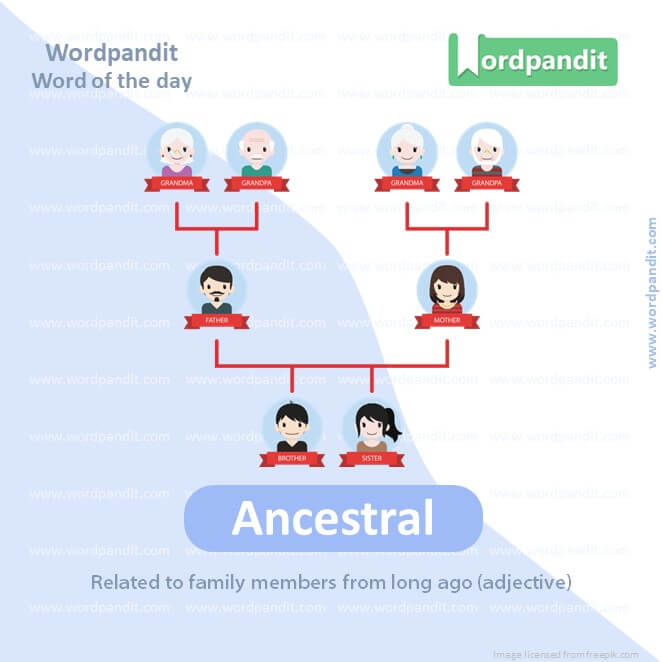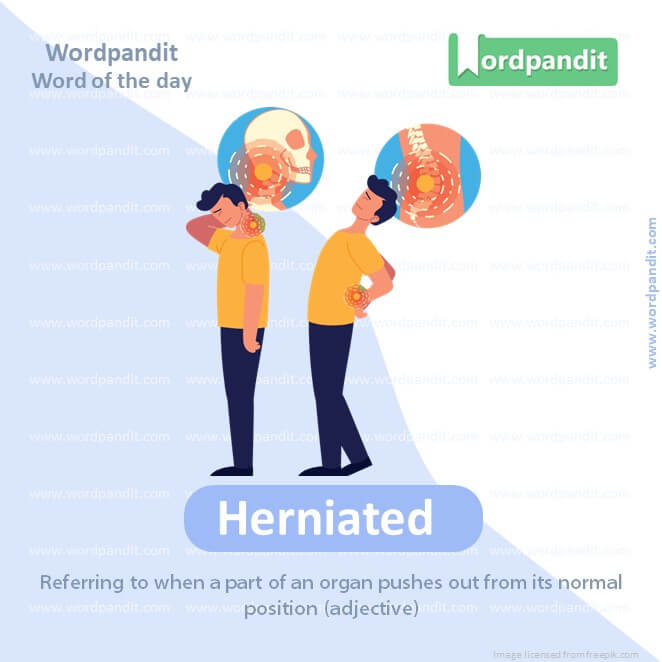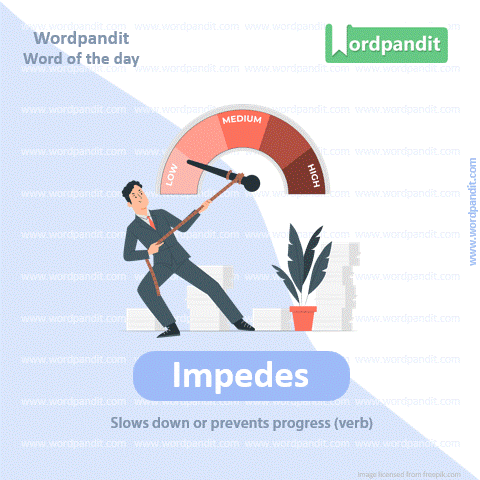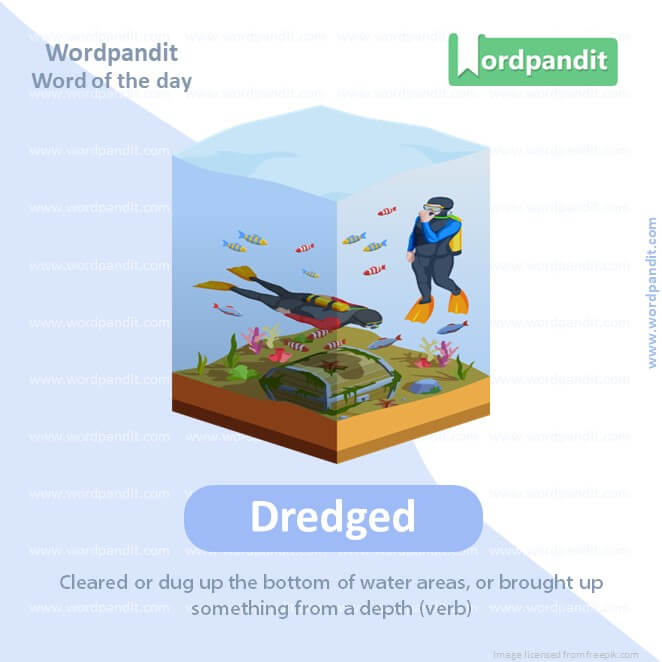Daily Vocabulary Words: List of Daily Used Words in Leading Indian Newspapers
Hi there. Welcome to this special section @ Wordpandit. Our endeavour here is straightforward: highlighting daily vocabulary words that you would come across in leading newspapers in the country. We have included the following newspapers in our selection:
• The Times of India
• The Economic Times
• Hindustan Times
• Mint
• Indian Express
We are putting in extensive work to develop your vocabulary. All you have to do is be regular with this section and check out this post daily. This is your repository of commonly used words; essentially, we are posting a list of daily used words. Hence, this has significant practical application as it teaches you words that are commonly used in leading publications mentioned above.
Visit the website daily to learn words from leading Indian newspapers.

WORD-1: Ancestral
CONTEXT: He identifies three foundational beliefs — patriotism, ancestral pride, and culture.
SOURCE: Indian Express
EXPLANATORY PARAGRAPH: Imagine a big family tree picture with many branches. On this tree, you can see your grandparents, their grandparents, and even more people from a long, long time ago. “Ancestral” is a word we use to talk about things or people that belong to or come from those older family members from the past. It’s like saying, “It’s from our family a long time ago!”
MEANING: Related to family members from long ago (adjective).
PRONUNCIATION: an-SES-trul
SYNONYMS: Hereditary, Lineal, Forefathers’, Progenitorial, Genealogical, Patrimonial, Descendant
USAGE EXAMPLES:
1. The old house has been in our ancestral line for centuries.
2. He wore an ancestral ring passed down from his great-grandfather.
3. They visited the ancestral village where their great-great-grandparents were born.
4. The ancestral customs are still celebrated during family gatherings.

WORD-2: Herniated
CONTEXT: She developed severe low back pain in 2014 and was diagnosed with herniated discs.
SOURCE: Hindustan Times
EXPLANATORY PARAGRAPH: Imagine a balloon filled with water, and there’s a tiny hole in it. Some water may push out through that hole. In our body, sometimes a part of an organ, like the spine, pushes out from where it should be, just like that water in the balloon. That’s called “herniated.”
MEANING: Referring to when a part of an organ pushes out from its normal position (adjective).
PRONUNCIATION: HER-nee-ay-ted
SYNONYMS: Bulging, Protruded, Prolapsed, Slipped, Displaced, Ejected, Thrust out
USAGE EXAMPLES:
1. She has a herniated disc in her back.
2. The doctor explained how a herniated disc can cause pain.
3. After the accident, he discovered a herniated disk in his spine.
4. Physical therapy may help those with a herniated disc.

WORD-3: Impedes
CONTEXT: She has thoroughly understood the nuance of the cultural and academic issue which impedes individuals’ abilities to become competitive with their peers who apply to the world’s best universities.
SOURCE: Times of India
EXPLANATORY PARAGRAPH: Imagine you’re running in a race, but someone puts hurdles in your way, making it harder to run. The word “impedes” means something is slowing you down or stopping you from doing something easily.
MEANING: Slows down or prevents progress (verb).
PRONUNCIATION: im-PEEDZ
SYNONYMS: Hinders, Obstructs, Blocks, Thwarts, Inhibits, Restrains, Delays
USAGE EXAMPLES:
1. The heavy rain impedes our travel plans.
2. Lack of resources often impedes the progress of the project.
3. The fallen tree impedes the road, causing a traffic jam.
4. His injury impedes his ability to play soccer.

WORD-4: Tapestry
CONTEXT: These individual stories created a tapestry that depicted the vast spectrum of global educational aspirations and the efforts to achieve them.
SOURCE: Times of India
EXPLANATORY PARAGRAPH: Imagine a big and beautiful cloth with many colors and pictures woven into it. This cloth tells a story or shows a scene. This special kind of artwork made of threads is called a “tapestry.”
MEANING: A decorative woven cloth with designs or pictures, often used as a wall hanging (noun).
PRONUNCIATION: TAP-ess-tree
SYNONYMS: Hanging, Drapery, Embroidery, Arras, Brocade, Cloth artwork, Mural
USAGE EXAMPLES:
1. The museum displayed a medieval tapestry from the 14th century.
2. She admired the detailed tapestry in the palace.
3. The tapestry on the wall tells the story of a famous battle.
4. He bought a beautiful tapestry during his trip to India.

WORD-5: Dredged
CONTEXT: With a dredged depth of 20 metres, Vizhinjam is being advertised as “India’s first deepwater port” that can not only berth the largest merchant ships but also cope with a huge quantum of container traffic.
SOURCE: Hindustan Times
EXPLANATORY PARAGRAPH: Imagine a big machine taking mud, sand, and other stuff from the bottom of a river or lake and bringing it up. This action of cleaning or digging up things from the water is called “dredging.”
MEANING: Cleared or dug up the bottom of water areas, or brought up something from a depth (verb).
PRONUNCIATION: DREJ-d
SYNONYMS: Excavated, Scooped, Cleared, Dug, Retrieved, Unearthed, Hollowed
USAGE EXAMPLES:
1. They dredged the river to make it safer for boats.
2. After the shipwreck, divers dredged up the lost treasures.
3. The port needs to be dredged regularly to prevent silting.
4. He dredged up memories from his past when he visited his old home.
WORD-6: Marginalisation
CONTEXT: Muslim marginalisation has been criticized as a political gimmick.
SOURCE: Indian Express
EXPLANATORY PARAGRAPH: Imagine you draw a big circle and put most of your toys inside it, but some toys are left outside, near the edge. Those toys on the edge might feel left out or not as important. When people or groups are treated this way, like they’re less important or pushed to the edge, we call it “marginalisation.”
MEANING: The process of making someone or a group feel less important or pushed to the edge of society (noun).
PRONUNCIATION: mar-jin-uh-lie-ZAY-shun
SYNONYMS: Side-lining, Ostracism, Alienation, Discrimination, Exclusion, Neglect, Isolation
USAGE EXAMPLES:
1. The indigenous people often face marginalisation in many societies.
2. Marginalisation of certain groups can lead to social unrest.
3. The new policy aims to reduce the marginalisation of the elderly.
4. She spoke out against the marginalisation of minority communities.
WORD-7: Cherishes
CONTEXT: Does it mean that the Hindutva of contemporary RSS is different from Savarkar’s Hindutva, which cherishes India
SOURCE: Indian Express
EXPLANATORY PARAGRAPH: Imagine you have a favorite toy that you love very much, and you take really good care of it. That means you “cherish” it. When we cherish something, we care about it a lot and think it’s very special.
MEANING: Holds dear or values highly (verb).
PRONUNCIATION: CHAIR-ish-ez
SYNONYMS: Adores, Values, Treasures, Holds dear, Appreciates, Esteems, Loves
USAGE EXAMPLES:
1. She cherishes the memories of her childhood.
2. Every parent cherishes their child’s first steps and words.
3. He cherishes the watch because it was a gift from his grandfather.
4. The community cherishes their traditions and celebrates them every year.
WORD-8: Excoriating
CONTEXT: A Palestinian guest will only see the virtue and veracity of his own position whilst excoriating that of Israel.
SOURCE: Hindustan Times
EXPLANATORY PARAGRAPH: Imagine someone telling off a naughty cat very strongly for doing something bad. When we use strong words to criticize or scold something or someone, we are “excoriating.”
MEANING: Criticizing or scolding severely (verb).
PRONUNCIATION: ex-CORE-ee-ay-ting
SYNONYMS: Scolding, Blasting, Lashing, Rebuking, Condemning, Castigating, Chiding
USAGE EXAMPLES:
1. The teacher was excoriating the student for his rude behavior.
2. The review was an excoriating critique of the movie.
3. She wrote an excoriating letter to the editor about the city’s policies.
4. After the scandal, the leader faced excoriating criticism from the public.
WORD-9: Testimony
CONTEXT: The fact that the Bill was approved by an overwhelming majority is a testimony to the present government’s commitment to women’s empowerment.
SOURCE: Indian Express
EXPLANATORY PARAGRAPH: Imagine someone standing in a court, telling what they know about something that happened. This telling of what they saw or know is called their “testimony.” It’s like sharing a story about something important.
MEANING: A statement given as evidence or proof, often in a court (noun).
PRONUNCIATION: TEST-i-moh-nee
SYNONYMS: Statement, Declaration, Affirmation, Assertion, Deposition, Account, Report
USAGE EXAMPLES:
1. Her testimony helped solve the case.
2. He gave a testimony about what he witnessed that night.
3. The judge listened carefully to each witness’s testimony.
4. Her personal testimony inspired many in the audience.
WORD-10: Comprehending
CONTEXT: It entails comprehending the subtleties of an application, discerning unspoken aspirations, and recognizing dormant potential.
SOURCE: Times of India
EXPLANATORY PARAGRAPH: Think about reading a book and understanding the story inside. When you “comprehend” something, it means you understand it or get what it’s saying.
MEANING: Understanding or grasping the meaning (verb).
PRONUNCIATION: com-pre-HEND-ing
SYNONYMS: Grasping, Getting, Fathoming, Apprehending, Realizing, Perceiving, Discerning
USAGE EXAMPLES:
1. She had trouble comprehending the complex instructions.
2. Are you comprehending what I’m trying to explain?
3. Despite reading the book three times, he wasn’t comprehending the main idea.
4. The teacher asked if everyone was comprehending the lesson.
vocabulary upsc
The Union Public Service Commission (UPSC) examination represents a significant milestone for many aspirants across India. Part of the journey to success involves comprehending and utilizing a robust ‘vocabulary UPSC’ that can set competitive exam takers apart from the crowd. Let us delve into the nuances of how this essential resource can be mastered effectively.
For starters, one has to understand the significance of ‘vocabulary UPSC.’ This is much more than rote learning a word list. It’s about understanding the connotations, the nuances, and the context in which these words are used. This understanding can greatly improve not only your comprehension skills but also your performance in the English language section of the The Union Public Service Commission exam.
Following the understanding stage, come practice and revision. ‘Vocabulary UPSC’ learning cannot occur overnight, and it is essential to devote a specified time daily to learn and review new words. Incorporating vocabulary-learning into your daily study habit can help you enhance your linguistic skills and aid in long-term retention.
Another much-needed approach to ‘vocabulary UPSC’ is using the learned words in regular communication. This method reinforces learning and aids retention. Additionally, creating a personal word diary where you note down new words, their meanings, and context can serve as your go-to guide for revision.
One common misconception about ‘vocabulary UPSC’ is that it’s only limited to English. However, it is vital to understand that the concept extends beyond languages. Terms used in subjects like History, Geography, or Economics should also be part of your vocabulary repository. This multifaceted conception can significantly aid in developing a comprehensive understanding of subjects, ultimately resulting in a higher score.
In conclusion, mastering ‘vocabulary UPSC’ requires consistent effort, deep understanding, and practical application. The journey to UPSC success is not just about learning; it’s about knowing how to use your learning effectively. So, embark on this discovery with a clear goal and unwavering dedication, and success will surely be yours.













